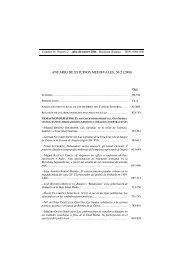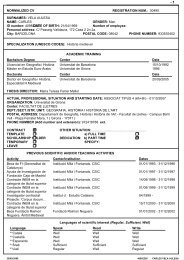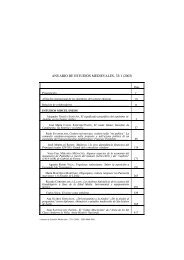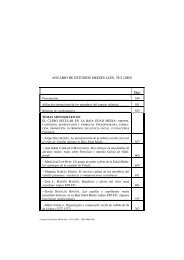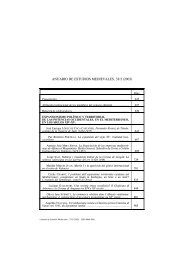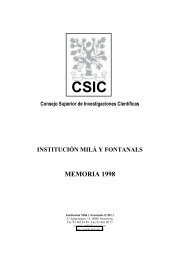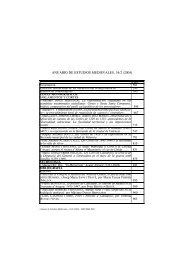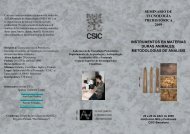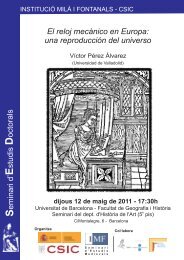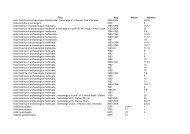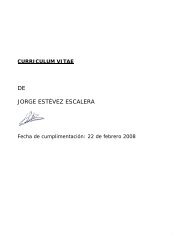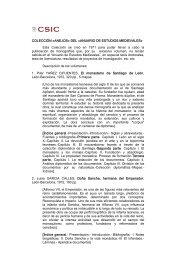El cos: objecte i subjecte de les ciències humanes i socials El ...
El cos: objecte i subjecte de les ciències humanes i socials El ...
El cos: objecte i subjecte de les ciències humanes i socials El ...
Create successful ePaper yourself
Turn your PDF publications into a flip-book with our unique Google optimized e-Paper software.
_______________________________________________________________<br />
28.01 tarda/tar<strong>de</strong>/afternoon<br />
S. PARAL·LELES/ S. PARALELAS/ PARALLEL SESSIONS:_______________<br />
I. Sala d’actes <strong>de</strong> la IMF:<br />
In Sickness and In Health: Disease, Healing, and Muslim Religious I<strong>de</strong>ntity<br />
According to Ibn ‘Asim al-Gharnati (d. 857/1453)<br />
6<br />
Linda G. Jones<br />
Institució Milà i Fontanals<br />
CSIC, Barcelona<br />
The literary work Jannat al-rida fi-l-taslim li-ma qaddara Allah wa-qada (The Gar<strong>de</strong>n of Delight in<br />
Surren<strong>de</strong>ring to God’s Will) by Ibn ‘Asim al-Gharnati 1 is a bel<strong>les</strong>-lettristic (adab) compendium of<br />
edifying anecdotes of real people who were afflicted with calamity and obtained relief from it. Ibn<br />
‘Asim’s typology of affliction inclu<strong>de</strong>s suffering the loss of honor, social status, and wealth; the<br />
loss of personal liberty through incarceration; the loss of one’s homeland through forced exile;<br />
and suffering physical harm through shipwreck, torture, or illness. The anecdotes were<br />
<strong>de</strong>dicated to the <strong>de</strong>posed Nasrid sultan al-Ghalib bi-Llah and sought to vindicate the legitimacy<br />
of his reign by portraying him as the personification of triumph over adversity through his<br />
exemplary reliance upon God and, ultimately, to exhort the Granadans to wage jihad against<br />
Castile.<br />
This paper will analyze Ibn ‘Asim’s stories about bodily disease and healing, treating them as an<br />
example of the body as a site of i<strong>de</strong>ological production that is constituted by the author’s<br />
particular vision of Sunni Islam and <strong>de</strong>ployed by him in his quest to attain Andalusi Muslim<br />
re<strong>de</strong>mption from the threat of Christian Castile. I will first discuss the author’s theology of<br />
disease, illustrating that although he attributes the affliction of disease to God, significantly he<br />
avoids <strong>de</strong>picting illness as punishment for sin. I then analyze Ibn ‘Asim’s representations of<br />
healing, offering a complement to Bryan Turner’s observations that “disease is not religiously<br />
neutral” 2 by arguing, likewise, that healing is not religiously neutral, but rather is represented<br />
here as an indicator of orthodox faith in and reliance upon God. I conclu<strong>de</strong> that Ibn ‘Asim does<br />
not intend to construct an image of Granada’s Muslims as mo<strong>de</strong>l sufferers, but rather as<br />
exemplary in their mo<strong>de</strong> of treating disease, and suggest that this image accords with his<br />
un<strong>de</strong>rlying goal of confronting Castile.<br />
1<br />
Abu Yahya Muhammad b. ‘Asim al-Gharnati, Jannat al-rida fi-l-taslim li-ma qaddara Allah wa-qada, ed. Sallah Jarrar, 4<br />
vols.,<br />
Amman, 1989.<br />
2 nd<br />
Bryan S. Turner, The Body and Society, London 1984, 2 ed., 2004, p. 89.<br />
De la misoginia heredada: María Magdalena y la mujer<br />
neogranadina en el siglo XVII<br />
Tania Lizarazo<br />
Ser mujer no es una condición anatómica. La existencia binaria <strong>de</strong> la humanidad, con base en<br />
su clasificación sexual obe<strong>de</strong>ce a construcciones cultura<strong>les</strong> e i<strong>de</strong>ológicas tan interiorizadas que<br />
están camufladas bajo categorías biológicas. Este proceso <strong>de</strong> construcción <strong>de</strong> i<strong>de</strong>ntida<strong>de</strong>s a<br />
partir <strong>de</strong>l sexo ha sido extenso; pero fue la inclusión <strong>de</strong> dogmas religiosos en la sustentación <strong>de</strong>



